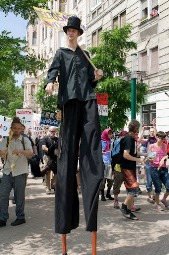 There is a housing crisis in Hungary today. Thousands of people live on the streets and in shelters, hundreds of thousands are terrified of the prospect of eviction or having to look for shelter in crowded, unhealthy apartments because they do not have any alternatives to the market price apartments and mortgages. The ratio of public housing is one of the lowest in the European Union (3%), and the number of empty, unused private and municipally owned apartments is increasing.
There is a housing crisis in Hungary today. Thousands of people live on the streets and in shelters, hundreds of thousands are terrified of the prospect of eviction or having to look for shelter in crowded, unhealthy apartments because they do not have any alternatives to the market price apartments and mortgages. The ratio of public housing is one of the lowest in the European Union (3%), and the number of empty, unused private and municipally owned apartments is increasing.
The Város Mindenkié (The City is for All) demands the development of a comprehensive housing policy from each and every local and the national government which would provide protection against massive unemployment and enables low income households to access to affordable housing via the expansion of social housing. One of the first steps would be the utilization of the unused, vacant buildings and apartments of the local governments and the inciting of establishing social tenancies in vacant, privately owned properties.
The AVM’s recommendations for the utilization of vacant apartments:
The registration of the vacant real estates and the publication of the statistical data.
The goal of the register is to gain information on the real estates which have been abandoned for a longer period of time (sometimes, even for years) for the local governments and the civil organizations in order to make these homes available for the programs concerning the utilization of empty apartments.
Granting temporary tenancies of the apartments, which are waiting for renovation or demolition, in public housing programs.
Instead of leaving certain apartments empty for years by citing plans for future demolitions, so called temporary tenancies should be established with indigent tenants. The contract could be for a single year (with options for renewal) for extremely benevolent rentrates or merely for the overhead charges. While this wouldn’t be a permanent solution of the tenants, it would win the them enough time to accumulate some saving or to look for other solutions. The bottom line is, do not evict the tenants until right the actual works begin to be conducted.
Surveying the requirements of turning non-inhabitable buildings into habitable residences.
Local governments should conduct a survey on the possibilities of turning state-owned, uninhabitable buildings into residences. Those which are not upgradeable are to be made available to civil organisations and small businesses which could energize the city.
Low-interest loans for the proprietors to renovate and rent their otherwise vacant and empty properties.
With the condition of, for a predefined date (i.e. at least for the duration of the loan) the lender must lend the property based on social criteria and on a rent below the market price.
Have civil organisations involved in the reconstruction/renovation programs.
Many civil organisations,(i.e. the Szociális Építő Tábor - Social Reconstruction Camp) have accumulated valuable experience in how could dilapidated apartments be renovated with the help of the (future) tenants. This is a relatively cheap and convenient solution for both the tenants and the local governments.
Permitting the temporary use of dilapidated, empty rooms and buildings.
The legal possibility must be established for the proprietors to enter into temporary contracts with individuals or organisations which would permit the legal but temporary utilization of said run-down buildings until such time, that the decision is made about its future. In a contract like this, tenants would not pay rent but would take it upon themselves to maintain the state of the building and the paying the overhead charges. Participants would agree on a fair time of notice to ensure the stabile use of the property.
Establishing social housing agencies for the utilization of unused real estates.
The social agencies would be maintained by local authorities, corporations or civil organisations. The agencies’ task would be the management of the social housing projects, including the empty private apartments. The proprietor would lend the flats on sub-market prices while the agencies would guarantee the revenues and the conditions of the apartments.
Establishment of a municipal management system for the vacant, privately owned apartments.
In the contractual system, the local authorities take over the management of the vacated building – for a predefined period of time - and lend it to impoverished.
Accessing the Union’s funds for urban renewal.
The European Union has several different funds allocated for urban renewal which are not contested by the by the Hungarian Government at all. These are funds could be used to finance programs for the utilization of the unused apartments.
The taxation of apartments abandoned for a long time.
The City Council shall designate the income for housing programs. If the proprietor resumes utilizing the real estate, then he would be exempted from the tax. The goal is to incite home owners to enter into the rental market providing homes for the people!


